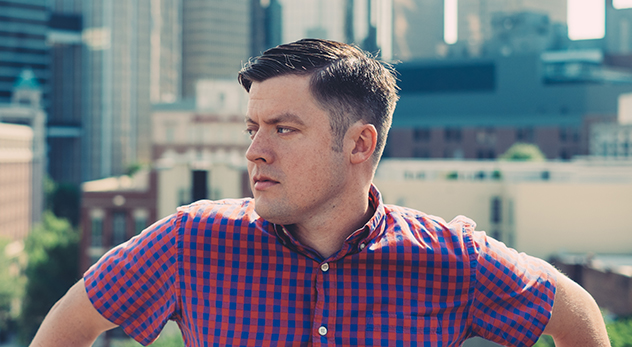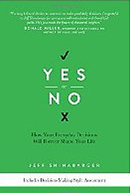
Jeff Shinabarger, a Christian social entrepreneur, says that our choices–when we say “yes” or “no”–has the power to change the course of our lives. – Photo courtesy of Jeff Shinabarger
Jeff Shinabarger is a Christian social entrepreneur and founder of Plywood People. He argues that two words have the ability to change everything in his new book, “Yes or No: How Your Everyday Decisions Will Forever Shape Your Life.” Here we discuss the power of the words “yes” and “no” and how we can leverage their power to better shape our lives.
RNS: Why “yes” and “no”? What intrigued you about these two words?
JS: It’s amazing how two words have the ability to change everything. Most decisions ultimately come down to the moment when you choose to say yes or no. I believe that these words are the most powerful in the dictionary. They define what we love, what we will be known for, and what we will do with our lives. These words can both open doors to new places and close doors to old spaces. [tweetable]Yes and no begin new stories and end old plot lines.[/tweetable] They are definitive words: words that significantly change the trajectory of life.
When you say yes or no, you give new direction to where you are going and what is still to come. Yes or no determines the hours you will spend in a job. Yes or no makes a commitment to a lifelong relationship. Yes or no shapes your character in times of stress. Yes or no brings you breathlessly to the doctor’s office to hear the heartbeat of a child. Yes or no commits you to buy and pay for a car and even a house. Yes or no is what leaves you anxiously waiting to hear if an investor chooses to give your idea funding or supports your social cause to help people in need. [tweetable]Most decisions come down to two small words that define everything.[/tweetable] Those words are yes and no.
RNS: Can you point to the critical moments when a particular “yes” or a “no” changed the course of your own life?
JS: I’ll give you one of each. I was planning on writing a book with a close friend and we had outlined the entire book and were beginning writing it and my wife (Andre) told me no. She didn’t think this project was something I should do. She didn’t have a clear reason in any way, but she just said no–the timing was not right.
Three months later, we received a call from our adoption agency telling us that we had been chosen for a baby girl. They were asking if we would take her to be our daughter. We said yes. There is no way I would have had the time or energy to get that book done when we adopted Jada.
We each have a philosophy of choice. Our philosophy of choice is shaped by what or who we love, what wisdom or experience we have been given, and what we feel called to do or hope to be known for in our lifetime.
RNS: You say they change the trajectory of our lives. Do they impact others?
JS: Sometimes we make choices and sometimes others’ choices determine what life looks like for us. Not every decision is made solely by ourselves or for ourselves. As we accept that we live in a world in which we are not islands but rather interconnected webs of people, we must learn to give and take with others as we make decisions. Sometimes when decisions are made for us, the only thing we can do is choose to respond to the new challenges. How we respond to others’ choices will reveal what we value and who we desire to become.
RNS: A lot of times “yes” is just easier than “no.” Is there a risk to saying too many yeses?
JS: The process of learning what to say no to draws us closer to what we ought to say yes to. We can’t be bashful in understanding what to get rid of; what we should not do is very valuable in getting to what we will do.
When I stop and think about all the busyness that fills my life, I often know there are things I should stop doing, but rarely do I cut them out of my life. The only way to find your unique calling is by saying “no” to those things that are not your calling. Say “no” to expectations that others have of you. Say “no” to choices that are good in order to find options that are better. Say “no” to opportunities that will lead you away from problems you feel called to address and some day will become known for solving. When we say “yes” to everything, we rarely accomplish anything significant.
RNS: Do you notice a difference in the decisions younger people are making and how someone later in life might face the same choice?
JS: I used to think that wisdom in decision-making would only happen when we get older in life. Since wisdom would only be found through longevity, it felt like an out-of-reach virtue. In order to gain wisdom from others, I would have to set up meetings with the elderly to listen and learn. I believe wisdom increases with life experience, knowledge and seeking God. You don’t suddenly become wise at a certain age. And just being old does not mean you are a sage. Wisdom in decision-making happens along the road. Older people have failed and succeeded in choices more times that younger people, which significantly shapes future choices.
RNS: You say you’ve found a way to eliminate the dilemma from decision-making. What tips can you offer us?
JS: The first place to start is to understand your unique decision-making style. There are seven styles: collective reasoning, data driven, gut reaction, list approach, story living, spiritually guided, and the passive undecided. Once you understand how you uniquely choose things, then you can surround yourself with other perspectives and invite them to the table in making major decisions. In the book there is also a process that leads people through making a good choice and touches on integrating all the styles into the process. We actually created a free tool to find your unique decision making style for free online at yesornobook.com.
Once you understand your style, I would recommend this simple process.
1) Write out all your options.
2) Know who will be influenced by your decision.
3) Invite advisors to speak into your problem.
4) Understand what fears are impacting your decision.
5) Make time for solitude and prayer.
6) Collect all the information and make the next step.
We always wish we had more information to make difficult decisions, but sometimes we need to make a small step forward in a direction we feel is the best option at that moment. Every decision we make reveals new opportunities and challenges, remember it won’t end with just one choice – the choices keep revealing themselves.






